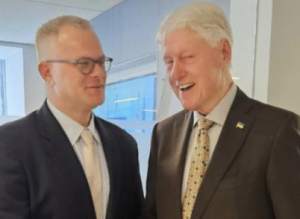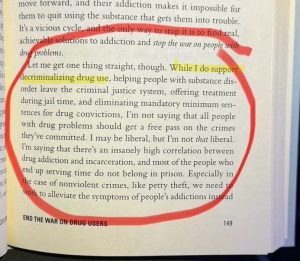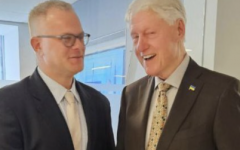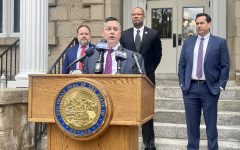
Democratic candidate Ryan Hampton walks AD-4 (Photo: @RyanForRecovery)
Scam ‘GOP’ PAC Spotlights ‘Bipartisan’ Democratic Candidate in Nevada Swing District
Of all the outlets to prove your rejection of toxic politics and embrace of bipartisanship, Ryan Hampton picked a doozy
By Megan Barth, September 26, 2024 11:18 am
Ryan Hampton, a self-proclaimed “fierce bipartisan advocate” endorsed by the Nevada Democratic party for the open seat in Assembly District 4, vows to “end toxic politics” and seeks to find bipartisan solutions to “make real change for Nevada’s hard-working middle class.”
Sounds nice, but Hampton’s comments made during a recent podcast indicate a strong, partisan alignment featuring toxic insults levied against republicans, despite the fact that he may need to work with republicans on bipartisan solutions and appeal to republicans and independents to flip the district. Although Democrats have a supermajority in the Assembly, they are only one Senate seat shy of a veto-proof supermajority. Governor Joe Lombardo has endorsed attorney Lisa Cole in the race.
Despite his bipartisan appeal, Hampton chose a scam “GOP” PAC, the Lincoln Project, to flex his ‘bipartisan’ bonafides in an interview led by one of the PAC’s bitter grifters Rick Wilson. The podcast reeked of bipartisanship when Hampton said “Lombardo should be ashamed of himself” for advancing stronger criminal justice laws, which ultimately died at the hands of the Democratic majority. The word “grifter” was used to label Lombardo’s surrogates, and ironically, Wilson agreed and accused Lombardo and his team of “abandoning humanity.”

For background, the Lincoln Project’s grift was exposed by the Associated Press (AP) and extreme-left Democrat Rep. Alexandria Ocasio Cortez publicly stated that their finances were approaching “scam terrority.”
In February 2021, the AP reported that of the $90 million Lincoln Project raised to “defeat Trump,” more than $50 million went to firms controlled by the group’s leaders and “exorbitant consulting fees collected by members of the group” in an “arrangement that avoids disclosure.”
For the collection of GOP consultants and former officials, being anti-Trump was becoming very good for business. Of the $90 million Lincoln Project has raised, more than $50 million has gone to firms controlled by the group’s leaders.
The Lincoln Project launched in November 2019 as a super PAC that allowed its leaders to raise and spend unlimited sums of money.
Its founders represent a who’s who of prominent Republican strategists on cable television, including [Steve] Schmidt and Reed Galen, both former advisers to John McCain; conservative attorney George Conway; former New Hampshire GOP chair Jennifer Horn; Florida-based veteran political ad maker Rick Wilson; and [John]Weaver, who has long advised former Ohio Gov. John Kasich.
Backed by its founders’ commanding social media presence, the organization quickly attracted a massive following of Trump critics in both parties that exceeded even its own founders’ expectations.
Since its creation, the Lincoln Project has raised $90 million. But only about a third of the money, roughly $27 million, directly paid for advertisements that aired on broadcast and cable, or appeared online, during the 2020 campaign.
The vast majority of the cash was split among consulting firms controlled by its founders, including about $27 million paid to a small firm controlled by Galen and another $21 million paid to a boutique firm run by former Lincoln Project member Ron Steslow, campaign finance disclosures show.

An uglier revelation reported by the New York Times is that the leaders of Lincoln Project were repeatedly told about accusations of sexual harassment made by nearly two dozen boys and young men against co-founder John Weaver. The founders ignored them — and then lied about it when they finally came to light.
For years [John] Weaver sent unsolicited and sexually provocative messages online to young men, often while suggesting he could help them get work in politics, according to interviews with 21 men who received them.
His solicitations included sending messages to a 14-year-old, asking questions about his body while he was still in high school and then more pointed ones after he turned 18. (emphasis added)
Of all the outlets to prove your rejection of toxic politics and embrace of bipartisanship, Hampton picked a doozy.

A once-homeless and now-recovering opiod addict, Hampton became a career activist against drug addiction starting a nonprofit organization advocating for people with addiction and mental health challenges. His nonprofit aligned with the Clinton Global Initiative’s Overdose Response Network. Prior to his opioid addiction, Hampton was a staffer at the Clinton White House in the 1990’s.
Since its inception, Hampton’s nonprofit has morphed into an organization that trains community organizers, with a focus on Diversity, Equity and Inclusion, in order to break down the barriers of “systemic racism.”
Working to dismantle systemic racism can require both community action and legislative advances. In Oregon, racial justice advocates are working to require racial impact statements from chief sponsors of all legislative bills to analyze potential impacts to black, indigenous, people of color (BIPOC) communities. Assessing existing and future state laws for racial impacts and consequences can help communities that historically have been most marginalized and make sure nobody is being left behind when drafting state policy that impacts the recovery community.
His organization highlights failed legislation in California, Oregon, New York and Maryland as models for legislative and systemic change, including the decriminalization of drugs and removing the box on job applications that asks potential employees about criminal records before an interview.
Ballot Measure 110, an Oregon statute passed three years ago, decriminalized the use and “small” possession of all drugs (including heroin and fentanyl) in public spaces and provided voluntary addiction services through diverting cannabis tax revenue to addiction service providers. In two years, the state distributed over $300 million in marijuana tax revenue to 235 addiction services organizations, and reportedly treated 8,400 people. The measure was promoted by Hampton on X (formerly Twitter) as the “right approach.”
Yet, in March 2024 the Oregon legislature repealed the law, stating: “Today, the Oregon State Senate voted to repeal/reform Measure 110 and end the decriminalization experiment that has cost so many Oregonians their lives and has torn families and their communities apart.”
Tearing families and communities apart doesn’t sound like “making sure no one is left behind when drafting state policy that impacts the recovery community” or “making real change for Nevada’s hard-working middle class.”
In the last part of the interview with Wilson, Hampton denies that he ever advocated for the decriminalization of drugs. Maybe he has evolved since he wrote a book in 2018 entitled, “American Fix” where he wrote, verbatim: “I do support decriminalizing drug use.”

When asked for further clarification by The Globe, Hampton replied, “people with addiction who have not committed crimes need treatment, not jail.” When pressed further about introducing similar legislation to Measure 110 in Nevada, our attempt went unanswered.
David Marlon, a recovering addict and founder of recovery centers in Southern Nevada, countered this approach in an op-ed: “While it is widely understood that incarceration isn’t a solution to addiction, physically separating a person from their behavior, even for a short period of time via enforcement intervention, can be an integral part of the process.”
Hampton also teed up some red meat for Wilson by claiming that Lombardo’s PAC are “grifters of the worst kind” and claimed that surrogates and “dark money” were running ads attacking him for his former drug use and recovery by manufacturing lies and false headlines. According to Lombardo’s Better Nevada PAC, no such attack ads on his former drug use or recovery have been run.
Assembly leader Steve Yeager (AD-9), the mastermind behind AB 236 which decreased the penalties on felony theft by increasing the theft threshold and increased the legal amount of drug possession, has endorsed Hampton as a “problem solver.” To note, Washoe County District Attorney Chris Hicks publicly stated that AB 236 “rubber-stamped” drug use. During a presentation given early this year, Hicks warned that “Nevada is on its way to becoming California” and directly tied the legislation to data that demonstrated a significant spike in crime across the second-largest county in Nevada.
It is no doubt that Nevada has some problems, and Democrats have controlled the state legislature since 2016, but voters will have to decide if the failed Oregon model of decriminalizing drugs via decriminalizing drug use will solve the fentanyl crisis plaguing Nevada and if “bipartisan solutions” are the goal when Hampton chooses to sit down and spew toxic politics with a scam “GOP” organization.
- Illegal Alien Identified As Wrong-Way Driver in Fatal Crash That Killed LVMPD Officer - December 23, 2024
- Senator Rosen Joins Letter Raising Concerns About Pete Hegseth’s Nomination - December 20, 2024
- NV SOS Launches Four Investigations Into 2024 Election Violations - December 20, 2024





What? “Anti-toxic” is really actually “toxic”?
Who knew